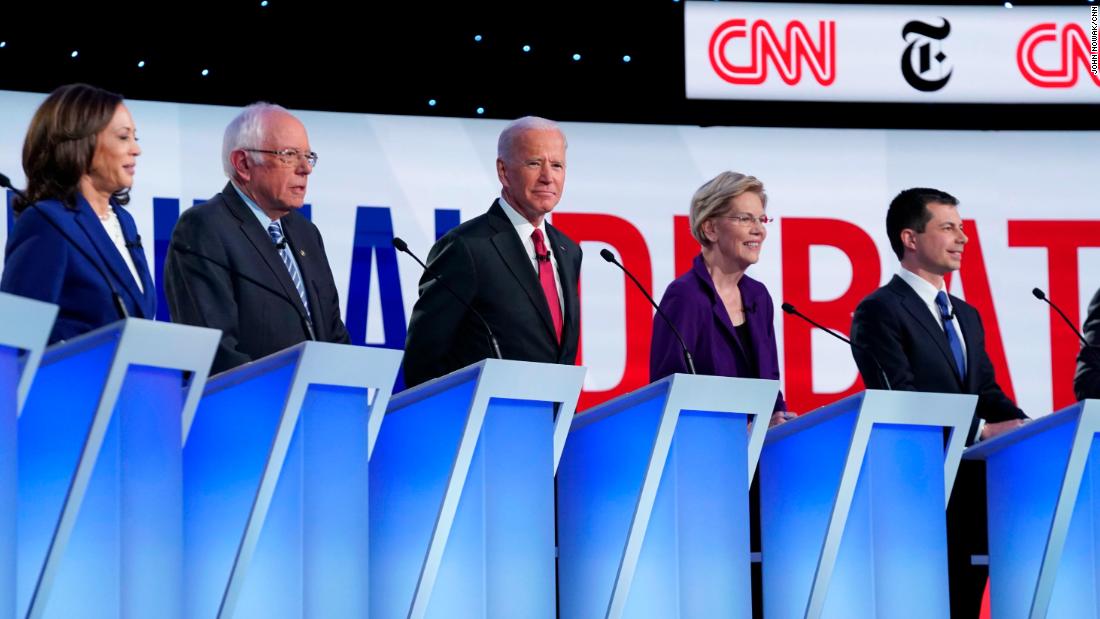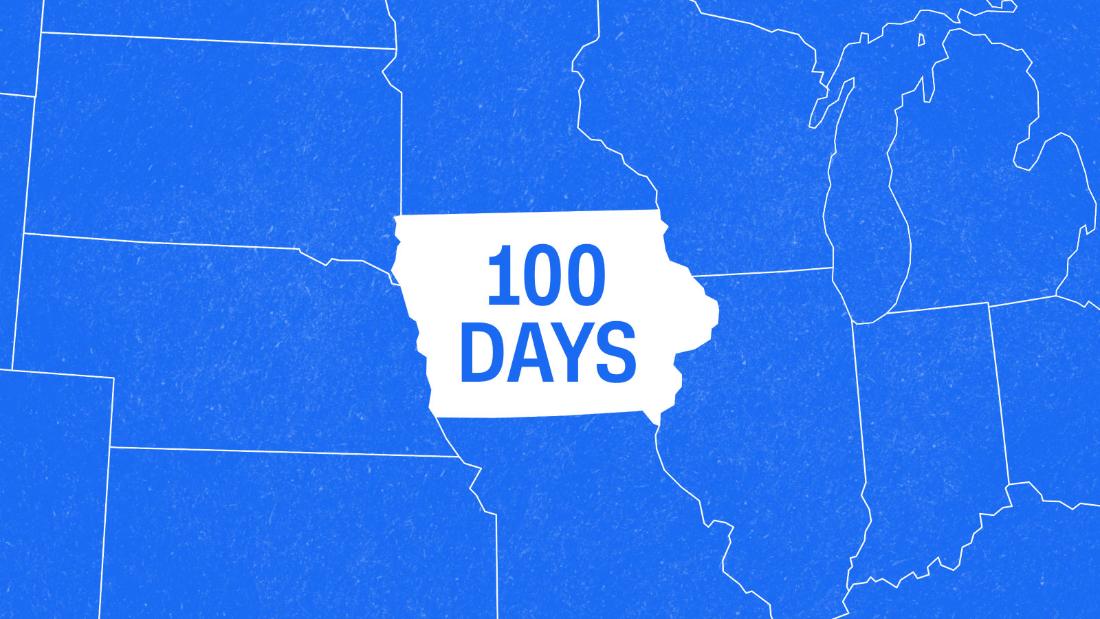While there’s zero proof of Clinton’s allegation, Gabbard’s odd behavior — skipping a Latino town hall event in Iowa to appear on Sean Hannity’s Fox News show — has raised questions about her ultimate motives in the race.
The problem for her is that she hasn’t qualified for the debate next month yet — and is running out of time. Speaking of the next debate and running out of time…
4. And then there were 18: Ohio Rep. Tim Ryan’s departure from the presidential race last week brings the field to 18 candidates. Which is still a ton! Especially when you consider
only half that number have qualified for the next Democratic debate in November.
For the remaining nine candidates, every passing day in which they don’t qualify for next month’s debate is one step closer to the certain end of their campaigns. Already Sen. Cory Booker (New Jersey) and former San Antonio Mayor Julián Castro have put out ultimatums to their donors: Start ponying up more money or I am out. (Booker’s ploy worked — for the moment.
Castro has said he needs to raise $800,000 before October 31 or his campaign will be over.)
Former Texas Rep. Beto O’Rourke, perhaps the highest profile candidate on the outside looking in right now. O’Rourke told CNN’s Wolf Blitzer earlier this month that he would remain in the race whether or not he made the November debate. Which, well, maybe. Not making the debate is a sign of waning viability — and that’s not what O’Rourke or any of these second tier (or below) candidates need to continue onward.
O’Rourke might be able to stay in — because he doesn’t have anything to lose. As in, no office to go back to. But, for Booker as well as the likes of Colorado Sen. Michael Bennet, they have day jobs — like Ryan. Which raises the likelihood that when the fifth debate comes and goes, a few more candidates will, well, go too.
3. The search for someone else (cont.): Despite the fact that Democrats still have 18 candidates running, there is rising sentiment in some parts of the party for another candidate to run. The theory of these nervous Democrats goes like this: former Vice President Joe Biden is losing altitude and Massachusetts Sen. Elizabeth Warren is too liberal to win the general election. And so, someone not in the race needs to get in to save Democrats from themselves.
The names most commonly mentioned in that regard are people like Hillary Clinton, John Kerry and Michael Bloomberg. Which means that this week will be filled with those people being asked to either rule in or out the possibility of a late entrance into the presidential contest.
Clinton, for her part, hasn’t said anything about 2020 of late. But her longtime adviser Philippe Reines made news late last week when he
seemed to suggest the door was open for a third Clinton presidential bid. Given that, Clinton almost has to say something this week about her interest (or lack thereof).
The pressure will be slightly less on the likes of Kerry, etc. — but there’s no question that anyone and everyone who once expressed even a passing interest in 2020 only to take a pass is going to get a round of questions this week about whether they might be reconsidering.
2. Trump bump? Or same old slump?: President Donald Trump’s
announcement Sunday morning that he had authorized a mission that led to the death of
ISIS leader Abu Bakr al-Baghdadi is a major moment in his time in office. Trump called the death “the top national security priority of my administration.”
The political question now is whether the high-profile death of the world’s most dangerous terrorist will impact Trump’s long-stagnant approval numbers. In a
CNN poll earlier this month, just 40% said they approved of the way Trump was handling his role as commander-in-chief while 57% disapproved. Those numbers are almost exactly in line with Trump’s broader job approval in the poll: 41% approve, 57% disapprove.
The closest analog we have comes from May 2011 when then President
Barack Obama announced that Osama bin Laden had been killed in a US military operation. Polling in the immediate aftermath of that announcement
gave Obama a 6-point boost, although his approval numbers largely returned to normal within a few weeks.
Obviously, bin Laden was a more known name than Baghdadi to the average American. And it’s unclear whether there is anyone in either the pro- or anti-Trump camp who would change their opinion based on any sort of external event. But if there would be movement, it could be in the wake of a big moment just like this one.
1. The Iowa state of play: With Iowa less than 100 days away now, it’s worth taking a look at the state of play in the state that kicks off the 2020 voting.
And it’s clear from even the most cursory glance that Warren is the clear Iowa favorite — in both polling, ideological positioning and organizational heft. A look at the
Real Clear Politics polling average shows Warren averaging 23% followed by former Vice President Joe Biden at 18% and South Bend Mayor Pete Buttigieg at 16%. Vermont Sen. Bernie Sanders takes 13%. No other candidates is in double-digits — or close.
That’s a change from the start of the race when Biden was the clear Iowa favorite — thanks to residual name ID from eight years in the White House alongside Obama. Biden has faded somewhat as Warren and Buttigieg have risen although the most precipitous drop in Iowa belongs to Harris, who was polling in the mid-teens in the state as late as this summer. (Harris signaled in August
her plan to focus heavily on Iowa; she has shown no tangible results for that push just yet.)
Of the top-tier candidates, Sanders has spent the most time in the state, according to the
Des Moines Register’s candidate tracker. The Vermont senator has done 80 events over 33 days in the state as compared to 65 events in 31 days for Harris and 64 events over 35 days for Buttigieg. Warren, despite her edge, trails that group with 58 events in 31 days while Biden brings up the rear of the front pack with 41 events over 22 days. (Biden entered the race this spring, later than several of his main rivals.)
Iowa Democrats have tended toward liberal candidates in recent years. Despite being a major underdog to Hillary Clinton nationally in 2016,
Sanders came within 3 points of beating the former secretary of state there in 2016. In 2008, Obama, who was regarded as the most liberal of the top-tier candidates, won Iowa. That bodes well for Warren who is positioned (along with Sanders) as the two most liberal candidates in the field.
The final stretch in Iowa begins in earnest this Friday night as the field descends on Des Moines for the Iowa Democratic Party’s Liberty and Justice Celebration.


